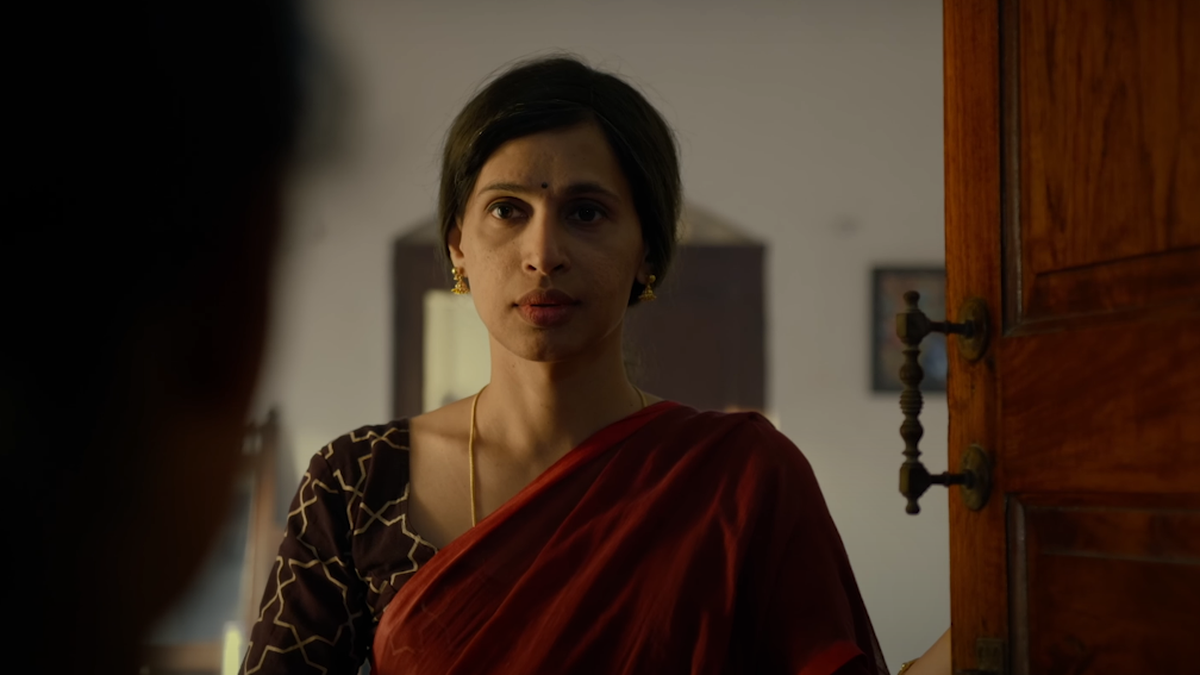
A still from ‘Neela Nira Sooriyan’ | Photo Credit: Moviebuff Tamil/YouTube
In mainstream cinema, films that attempt to forge a new trail get judged on whether the experiment does justice to the themes without alienating the masses of that milieu. Queer themes — unfortunately as it may — are still considered niche. And the criteria of a ‘good’ mainstream queer drama are how accurately the queer characters are represented; whether it also speaks to the larger audiences who watch it from their cisgender-heterosexual lenses; and if it could break the notion that all issue-based queer films are melodramatic sob fests. On all that accord, Samyuktha Vijayan’s directorial debut, Neela Nira Sooriyan (Blue Sunshine), is a breath of fresh air.
For those familiar with European queer films, the story of Neela Nira Sooriyan might initially appear a tad too simple — a teacher, assigned male at birth, from a conservative backdrop, transitions into a woman. Yet, within the boundaries of this story, the writer-director manages to weave in quite a few underexplored ideas in the Tamil queer cinema space, making it a fascinating watch. The very first scene of this film shows Aravind (Samyuktha Vijayan), on a closeted journey to become Bhanu, taking steps towards perfecting voice feminization. In yet another shot, as a passing detail, we see them (Aravind’s preferred pronoun during transition isn’t clear) remove the binding off their chest, in a bid to hide breast formation, since they are still male-presenting to the world outside. Later on, when she dresses up to work as a woman for the first time, we are told that she took her time, anxiously ensuring she looks as perfect as she desires, fighting a world of dysphoria. How delicately such ideas are written deserves credit.

Neela Nira Sooriyan stands out as one of those rare queer films that are set on a rural backdrop (in Pollachi), populated by convincing characters. People in this world — no matter how little time they get — make an impression by how organically they interact with the protagonist and her situation. You see a mother (Geetha Kailasam) grapple with the reality that her son is her daughter, and that she must not call her with male pronouns. You see how it hurts Bhanu when she is deadnamed, and how uninformed the people around her are of gender identity, but the writing doesn’t unnecessarily vilify them either.
Neela Nira Sooriyan (Tamil)
Director: Samyuktha Vijayan
Cast: Samyuktha Vijayan, Geetha Kailasam, Gajaraj, Kitty
Runtime: 97 minutes
Storyline: Follows the struggles faced by Aravind, who embarks on a life-changing journey to transition into a woman, Bhanu
The film becomes a socio-drama when we see how the people in the private school where Bhanu works as a Physics teacher refuse to accept her as a woman. While the contemptuous Vice Principal (KVN Manimegalai) and fellow teachers make life hard for Bhanu, you lose hope when you see how even the Correspondent permits Bhanu to be herself only because the business would benefit from a woke-targeted PR drive. An arc involving a fellow teacher even touches upon how cis-het men fetishise women who have undergone transition.

Samyuktha’s attempt to expose the unempathetic social environment of our educational institutions lends a discourse on the choice of restroom for transgenders. Given the reality of how even those who empathise with transsexuals refuse to accept gender queers, it helps that we get a sub-plot about a non-binary student in the school, Karthik (Masanth Natarajan), who gets bullied for being themself and upon witnessing Bhanu’s bold move, confides in her. This subplot does initially appear quite contrived, especially with the lack of space to make a convincing case study about gender plurality in a cis-heteronormative society. Thankfully, Samyuktha organically bridges Karthik to Bhanu’s world to strike a parallel. It also takes real conviction to show your trans protagonist as someone who isn’t well-equipped to comprehend the plight of other queer identities. Given how fragmented some sections of the LGBTQIA+ are, this is quite a bold move.
Karthik’s case, and the reality Bhanu is forced to live in, make for a heart-shattering case of how the larger system exploits those who refuse to conform to its norms. A scene set at a government institution shows how even the provisions in place to ‘help’ queer people only end up becoming orders to be followed, or as a weapon to other those who fall outside the binary cis-gender spectrum. Is it that hard to understand that some transpersons wish to be identified by their transness and that some others transition to be identified by the sex they are transitioned into?
Now, the grouse one feels about Neela Nira Sooriyan is how it tips the scale more towards this exercise to critique the system, that you don’t get space to understand Bhanu as who she is. We are told of her only from her relationships with others than with herself; even when she expresses her feelings to a psychologist (Kitty), it’s on the surface. In the same scene, we get a spectacular dialogue about how the world knows only Aravind and vice versa, and that it’s time to give Bhanu some space to experience this world. Such a deeply personal discussion could have extended as an undercurrent throughout the film.

Such nuances are also why you wish the film breathed a little more. One was hoping for a moment or a dialogue about how she used to express her femininity within closed doors before she came out; did she have a private safe of pictures of her wearing women’s clothes? How difficult was it to hide her make-up? Samyuktha’s film, however, had different purposes.
Neela Nira Sooriyan is a leap forward in the right direction for Tamil queer cinema. Neat performances, deft writing choices, excellent sound design, and a subtle treatment make it an engaging film to invest in.
Neela Nira Sooriyan is currently running in theatres
Published – October 04, 2024 04:08 pm IST


